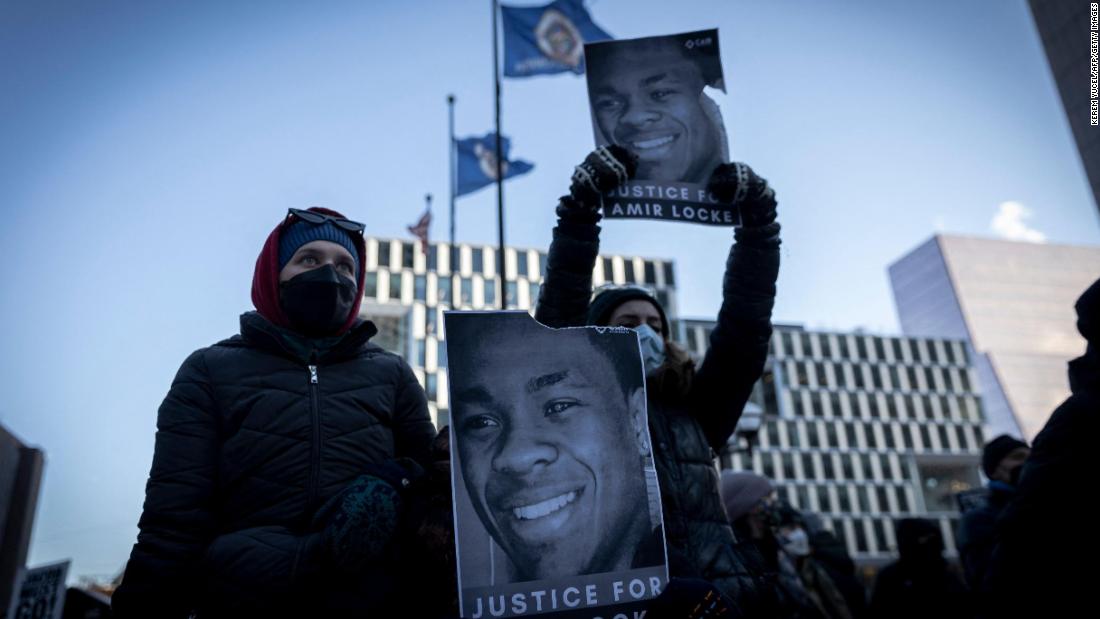“After a thorough review of all available evidence … there is insufficient admissible evidence to file criminal charges in this case,” according to a statement from the county attorney and state attorney general released Wednesday.
At the time Locke was shot, he was in legal possession of the firearm, inside the apartment, according to prosecutors, but they said that wasn’t relevant to the investigation. According to the statement from prosecutors, Locke’s actions after officers entered the apartment “on a judicially authorized search warrant” constituted a “specifically articulable threat.”
“These circumstances are such that an objectively reasonable officer in Officer (Mark) Hanneman’s position would have perceived an immediate threat of death or great bodily harm that was reasonably likely to occur, and an objectively reasonable officer would not delay in using deadly force,” according to the statement from Attorney General Keith Ellison and Hennepin County Attorney Michael Freeman.
Jeff Storms, an attorney for Locke’s family, said it was a “disappointing day for the family.”
“They just have a very strong belief that the incredible wrong that happened to Amir is going to save other people’s lives,” Storms told CNN. “They’re not going to let the lack of criminal charges slow them down one bit.”
Locke’s mother said he was working as a food delivery driver and had the gun for protection. She said her son was cremated because she didn’t want her son’s remains to stay in Minneapolis.
“Did you think I was gonna bury my son in the ground of the place that murdered him? No, wherever I go, my baby’s going. I don’t live in the Twin Cities. I left the Twin Cities. I took my son with me when I left the Twin Cities,” Karen Wells said.
The Police Officers Federation of Minneapolis praised the prosecutors’ decision, saying Hanneman was “faced with a deadly threat and he had to make a split-decision decision” to protect himself and others.
It added: “The use of deadly force by an officer is never taken lightly and weighs heavy on the officers involved. This incident was a tragedy for everyone involved and will have a lasting impact on many lives.”
What video they did release showed an officer quietly sliding a key into the apartment’s door. After the door opens, a group of officers enter, yelling commands. After officers keyed into the apartment, Locke looked over the back of the couch, ducked down under a blanket, lowered a handgun, and then raised it toward the officer who then shot him three times, according to the statement from prosecutors announcing their decision.
During a news conference Wednesday, Ellison and Freeman said they met with Locke’s family in the morning to inform them of their decision.
“We expressed our personal sympathies and empathies with the family,” said Freeman. “They, like us, are very frustrated with no-knock warrants.”
Hanneman, the officer who shot Locke, was wearing a body-worn camera and provided a written statement to investigators.
“I felt in this moment that if I did not use deadly force myself, I would likely be killed,” he wrote. “There was no opportunity for me to reposition myself or retreat. There was no way for me to de-escalate this situation. The threat to my life and the lives of my teammates was imminent and terrifying.”
Hanneman returned to active duty on February 28, less than a month after shooting Locke, a city spokesperson told CNN on Wednesday. “Officer Hanneman was assigned to a role that fits the needs of the department and his service to the City of Minneapolis. That assignment does not include SWAT,” according to the spokesperson.
Ellison noted that his office was not allowed to evaluate the case “from the perspective of the victim,” and that it would have been “unethical” to file charges in a case that would not be able to prevail, because the law does not support criminal charges.
In their statement, Freeman and Ellison said that Locke might be alive today “absent the no-knock warrant used in this case.” But they also said their role in this investigation wasn’t to evaluate the use of the warrant — it was to look at the killing to determine whether criminal charges were warranted.
Storms said the family still plans to move forward with a civil lawsuit and the lack of criminal charges has “no impact” on that plan.
“I will add this, no-knock warrants aren’t particularly safe for officers either. They have attendant risks on both sides, civilians and officers, so it’s appropriate to investigate and come up with policy that works,” Ellison said at the press conference.
CNN’s Rebekah Riess and Jennifer Henderson contributed to this report.







